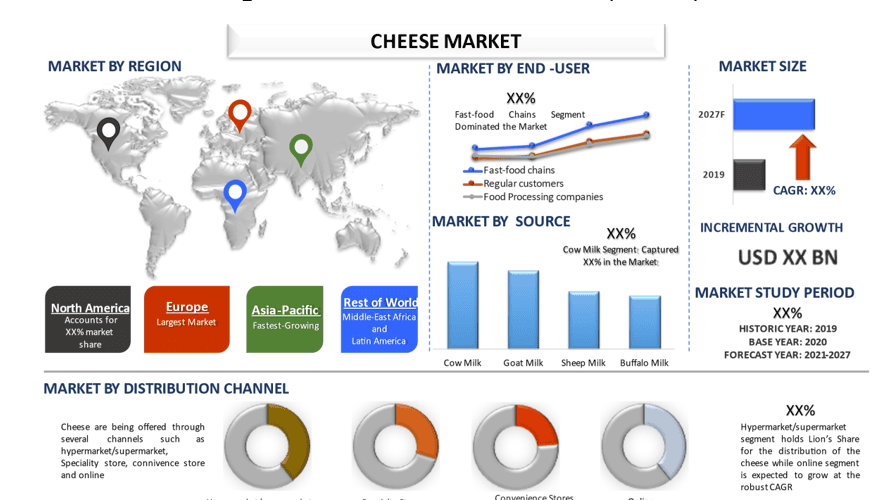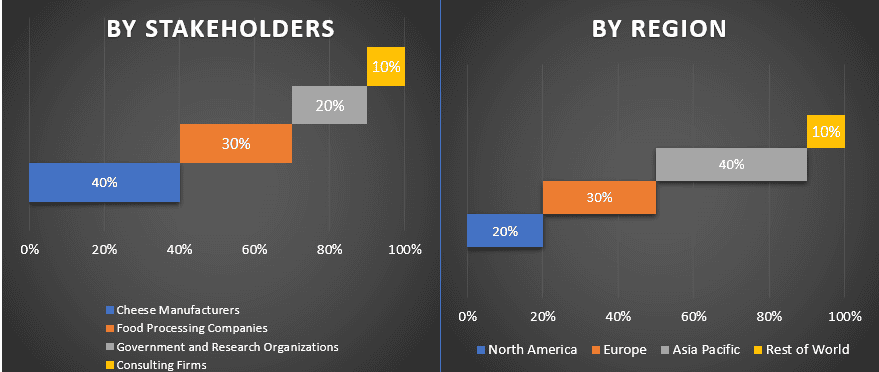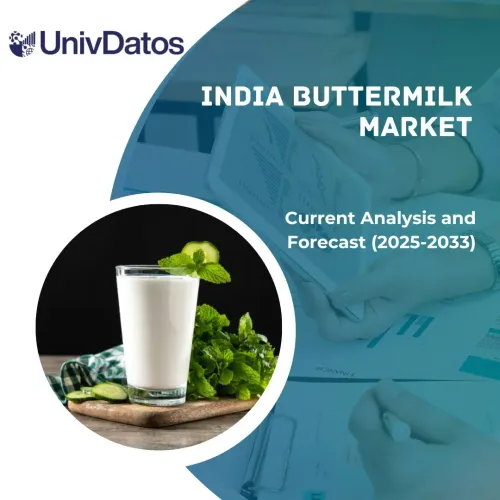- Home
- About Us
- Industry
- Services
- Reading
- Contact Us
Cheese Market: Current Analysis and Forecast (2021-2027)
Emphasis on Product (Mozzarella, Cheddar, Feta, Parmesan, Roquefort, Others); Distribution Channels (Hypermarket/supermarket, Specialty Stores, Convenience Stores, Others); Sources (Cow Milk, Goat Milk, Sheep Milk and Buffalo Milk); End-User (Fast-food chains, Regular customers, Food Processing companies), Region/Country

Cheese Market is expected to grow at a CAGR of around 4% over the forecast period (2021-2027).
The global cheese market is witnessing an uptick on account of the rise in the disposable income, surging number of cafe and restaurants and the rising consumption of junk food. In 2020, the number of pizza restaurants established was 78,092 in the United States alone. Even after the year-on-year fluctuations, the number of pizza restaurants was increased by roughly 6,000 units over the past 9 years. Moreover, as per Agriculture marketing resource center, total U.S. cheese production in 2020 was 13.25 billion pounds, up 2% from 2016 Moreover, per person cheese consumption win U.S was 40.2 pounds in 2020, 2% increase from 2016.
Moreover, emerging hotels chains due to emerging number of international tourists is also leading to the growing demand for the cheese, As per a report by IHG, the global hotel industry is a $525bn industry, made up of 18 million rooms in 2018. 54% of rooms are affiliated with a global or regional chain (‘branded’), up from 50% in 2012.Moreover, the number of international tourists increased from 1.966 billion in 2015 to 2.28 billion in 2019.
Insights Presented in the Report
“Amongst Product, Mozzarella segment dominated the market in 2020”
Based on product, Cheese Market is classified into Mozzarella, Cheddar, Feta, Parmesan, Roquefort, and others. By product, the Cheddar segment generated the highest revenue, in 2020, owing to its harder texture, creamier and sharp taste, and longer shelf life. In addition, the price of cheddar cheese is low as compared to that of other cheese like mozzarella, which make cheddar cheese affordable. Also, cheddar cheese is available in single slices wrapped in plastic, cheese spray, cheese spread, squeeze tube, and various other packaging options, which have opened a lot of opportunities for the market growth.
“Amongst Distribution Channels, Business to business segment dominated the market in 2020.”
Based on distribution channel, the Cheese market is segmented into hypermarket/supermarket, specialty stores, business to business and others. By distribution channel, the business-to-business segment generated the highest revenue, in 2020, owing to the surge in demand for QSR and online food delivery, which is propelling cheese market demand
“Amongst Sources, Cow Milk holds significant market share in 2020.”
Based on sources, the Cheese market is segmented into Cow Milk, Goat Milk, Sheep Milk and Buffalo Milk. The cow milk segment accounted for the highest revenue, in 2020. This is attributed to the presence of protein and fat in the milk which gives flavor and texture to the cheese. Furthermore, before the cheese making process starts, the cow’s milk is pasteurized by heating the milk to a precise temperature and then rapidly cooling it. Heating milk kills the harmful bacteria present in the milk.
“Amongst End-User, Fast-Food Chain segment holds significant market share in 2020.”
Based on End-User, the Cheese market is segmented into Fast-food chains, regular customers, and food processing companies. The fast-food chain segment grabbed the major market share and dominated the market. A growing demand for the fast-food among millenniums coupled with the launch of food items loaded with cheese is leading to the growing share of this segment. Pizza hut fast food chain is the largest buyer of cheese globally and accounts for 3% of U.S. cheese production. The company uses around 300 million pounds of cheese annually.
“Europe represents as the largest market in the Global Cheese Market”
European Union is the world market leader in the production of cheese in 2020. In 2020, the 27 countries that make up the European Union produced 10.35 million metric tons of cheese. In 2019, Germany was the number one exporter of cheese. The Netherlands, France, and Italy are all world renowned for their cheese production and were also some of the top exporters of cheese in that year. Moreover, the average American consumed 40 pounds of cheese in 2019, up from 35 pounds in 2010
Reasons to buy this report:
- The study includes market sizing and forecasting analysis validated by authenticated key industry experts
- The report presents a quick review of overall industry performance at one glance
- The report covers an in-depth analysis of prominent industry peers with a primary focus on key business financials, product portfolio, expansion strategies, and recent developments
- Detailed examination of drivers, restraints, key trends, and opportunities prevailing in the industry
- The study comprehensively covers the market across different segments
- Deep dive regional & country-level analysis of the industry
Customization Options:
Cheese Market can further be customized as per the requirement or any other market segment. Besides this, UMI understands that you may have your own business needs, hence feel free to connect with us to get a report that completely suits your requirements.
Table of Content
Analyzing the historical market, estimation of the current market, and forecasting the future of the Cheese Market were the three major steps undertaken to create and analyze the adoption of cheese across various regions globally. Exhaustive secondary research was conducted to collect the historical market numbers and estimate the current market size. Secondly, to validate these insights, numerous findings and assumptions were taken into consideration. Moreover, exhaustive primary interviews were conducted, with industry experts across the value chain of the industry. Post assumption and validation of market numbers through primary interviews, we employed a top-down/bottom-up approach to forecast the complete market size. Thereafter, market breakdown and data triangulation methods were adopted to estimate and analyze the market size of segments and sub-segments the industry pertains to. Detailed methodology is explained below.
Analysis of Historical Market Size
Step 1: In-Depth Study of Secondary Sources:
Detailed secondary study was conducted to obtain the historical market size of the Cheese through company internal sources such as annual report & financial statements, investor presentations, press releases, etc., and external sources including journals, news & articles, government publications, competitor publications, sector reports, third-party database, and other credible publications.
Step 2: Market Segmentation:
After obtaining the historical market size of the Cheese, we conducted a detailed secondary analysis to gather historical market insights and share for different segments & sub-segments for major regions. Major segments included in the report are by product, distribution channel, source and by end-user. Further regional & country-level analyses were conducted to evaluate the overall adoption of the Cheese Market in the global context.
Step 3: Factor Analysis:
After acquiring the historical market size of different segments and sub-segments, we conducted a detailed factor analysis to estimate the current market size. Further, we conducted factor analysis using dependent and independent variables such as rising disposable incomes, demand for processed food, etc. Historical trends and their year-on-year impact on the market size and share was analyzed. Demand and supply side scenario was also thoroughly studied.
Current Market Size Estimate & Forecast
Current Market Sizing: Based on actionable insights from the above 3 steps, we arrived at the current market size, key players in the Market, and market shares of the segments and company. All the required percentage split, and market breakdowns were determined using the above-mentioned secondary approach and were verified through primary interviews.
Estimation & Forecasting: For market estimation and forecast, weights were assigned to different factors including drivers & trends, restraints, and opportunities available for the stakeholders. After analyzing these factors, relevant forecasting techniques i.e., top-down/bottom-up approach was applied to arrive at the market forecast to 2027 for different segments and subsegments across the major regions globally. The research methodology adopted to estimate the market size encompasses:
- The industry’s market size, in terms of value (US$)
- All percentage shares, splits, and breakdowns of market segments and sub-segments
- Key players in the Cheese Market in terms of products & services offered. Also, the growth strategies adopted by these players to compete in the fast-growing market.
Market Size and Share Validation
Primary Research: In-depth interviews were conducted with the Key Opinion Leaders (KOLs) including Top Level Executives (CXO/VPs, Sales Head, Marketing Head, Operational Head, and Regional Head, Country Head, etc.) across major countries. Primary research findings were then summarized, and statistical analysis was performed to prove the stated hypothesis. Inputs from primary research were consolidated with secondary findings, hence turning information into actionable insights.
Split of Primary Participants in Different Regions

Market Engineering
Data triangulation technique was employed to complete the overall market estimation and to arrive at precise statistical numbers of each segment and sub-segment of the Cheese Market. Data was split into several segments & sub-segments post studying various parameters and trends in the areas of product, distribution channel, source and end-user for the major country/region globally.
The main objective of the Cheese Market Study
The current & future market trends of Cheese were pinpointed in the study. Investors can gain strategic insights to base their discretion for investments from the qualitative and quantitative analysis performed in the study. Current and future market trends would determine the overall attractiveness of the market at a regional & country level, providing a platform for the industrial participant to exploit the untapped market to benefit as a first-mover advantage. Other quantitative goals of the studies include:
- Analyze the current and forecast market size of Cheese in terms of value (US$). Also, analyze the current and forecast market size of different segments and sub-segments
- Segments in the study include of product, distribution channel, source, and end-user
- Analyze the current and forecast market size of the Cheese for the major regions & countries
- Major regions studied in the report include North America (United States, Canada, Rest of North America), Europe (Germany, United Kingdom, France, Italy, Spain, Rest of Europe), Asia Pacific (China, Japan, India, Australia, South Korea, Rest of Asia- Pacific), and Rest of World
- Company profiles of the Cheese Market players and the growth strategies adopted by them to sustain in the fast-growing market
Deep dive regional & country level analysis of the industry
Related Reports
Customers who bought this item also bought










